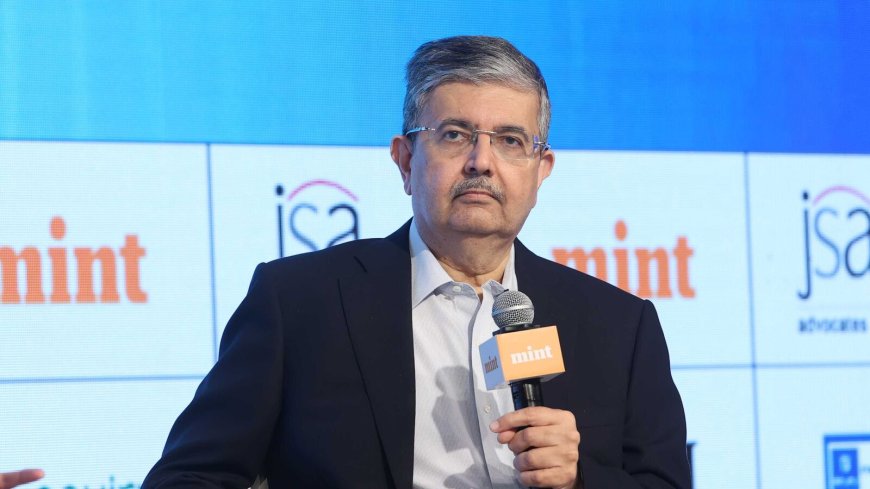Sebi ban on Jane Street! Uday Kotak flags 3 big concerns that plague Indian stock market
SEBI bans Jane Street over market manipulation. Uday Kotak flags 3 systemic concerns in Indian stock markets: low free float, thin liquidity, and regulatory arbitrage.

Introduction
The Indian capital markets are once again in the spotlight after the Securities and Exchange Board of India (SEBI) barred US-based high-frequency trading firm Jane Street from participating in Indian exchanges. The regulatory clampdown has not only stirred debate on foreign investor compliance but also prompted industry stalwart Uday Kotak to raise red flags over systemic concerns in India’s equity ecosystem. In a tweet that has since gained significant traction, the veteran banker identified three major pain points that, if unaddressed, could impair investor confidence in the long run.
SEBI’s Action Against Jane Street
On July 3, SEBI announced enforcement action against Jane Street and another firm, Tower Research Capital, for allegedly engaging in unfair trade practices under the guise of arbitrage strategies. The regulator noted that these entities manipulated the market by placing large orders and canceling them to mislead participants — a form of “layering” or “spoofing” in high-frequency trading.
Jane Street, a global quantitative trading powerhouse, has long been a prominent foreign institutional investor (FII) in Indian markets. The SEBI order imposed penalties and barred the firm from trading in India for a year. While Jane Street has yet to respond publicly, the development has triggered wider discussions around regulatory transparency, algorithmic trading governance, and market accessibility for global players.
Uday Kotak Raises the Alarm
In response to SEBI’s stringent actions, Uday Kotak — founder of Kotak Mahindra Bank and one of India’s most respected voices in finance — flagged three critical issues through social media:
Low Free Float: Kotak pointed out that the Indian markets suffer from low public float in many large listed companies. With promoters and institutional investors holding bulk stakes, only a small percentage of shares remain actively traded. This skews price discovery and leads to higher volatility, especially when large trades are executed.
Thin Liquidity in Small & Midcaps: The second issue is the illiquidity in the small-cap and mid-cap space. “Even trades worth ₹10 crore can move the needle significantly,” he remarked. This creates opportunities for price manipulation and deters serious long-term institutional investment in broader market segments.
Regulatory Arbitrage: Kotak further raised concerns about inconsistent regulatory standards for domestic and foreign players. “While some foreign entities have the ability to exploit microsecond advantages or gaps, Indian players often face stricter scrutiny and cost burdens,” he added.
Kotak’s comments come amid growing chatter in financial circles that SEBI’s crackdown, though necessary for ensuring market integrity, must also be paired with reforms that enhance trust, depth, and transparency.
Market Reactions and Industry Sentiment
Following SEBI’s move, market participants remained mixed in their responses. Some welcomed the regulator’s vigilance over complex trading strategies, while others feared a chilling effect on foreign investor sentiment.
Amit Gupta, Fund Manager at ICICI Prudential AMC, stated:
“The action sends a strong message that India will not tolerate manipulation, regardless of the investor’s origin. However, consistent and well-communicated frameworks are essential to ensure confidence among genuine long-term participants.”
Meanwhile, foreign investor associations are reportedly engaging with SEBI to better understand the evolving compliance landscape. Analysts also believe that SEBI may soon roll out new disclosure norms for algorithmic traders and proprietary desk operations.
Historical Context: Jane Street and Algorithmic Arbitrage
Jane Street operates at the confluence of quantitative finance and high-frequency trading. With operations across multiple geographies, the firm is known for deploying sophisticated algorithms that capitalize on price differentials across exchanges — a strategy known as arbitrage.
In the Indian context, arbitrage has often thrived between the National Stock Exchange (NSE) and Bombay Stock Exchange (BSE), owing to minute price and latency differences. SEBI’s findings allege that Jane Street took undue advantage of these lags in a way that harmed retail investors and the price discovery process.
While India has seen regulatory action on algo trading before — including measures to pre-approve trading codes and throttle excessive orders — this is one of the most high-profile bans targeting a marquee global player.
Analyst View: Are Reforms on the Way?
Experts believe that the current episode is a wake-up call for Indian exchanges and regulators to work towards a more level playing field.
Meenakshi Sundaram, Market Strategist at Axis Securities, said:
“This is a moment for introspection. Do we have the infrastructure and oversight needed to manage cross-border, ultra-fast trading models? India is on the cusp of becoming a global financial hub, and robust systems must precede scale.”
There is also a growing push for SEBI to explore:
-
Greater transparency in Order Management Systems (OMS)
-
Introducing kill switches and circuit breakers specific to algorithmic trades
-
Widening float requirements, especially for large-cap stocks
-
Establishing uniform norms across domestic and foreign trading entities
Investor Outlook: Risk or Opportunity?
Retail and institutional investors should stay vigilant in the near term. While SEBI’s assertiveness enhances trust in market fairness, disruptions from ongoing probes or future restrictions on similar players could impact volumes and sentiments — particularly in arbitrage and derivatives-linked trades.
However, analysts believe this may ultimately lead to healthier markets.
Suresh Rao, a senior portfolio manager at a Mumbai-based PMS firm, noted:
“Clean-up operations like this are necessary if India aims to attract patient capital. If regulators simultaneously focus on liquidity, governance, and infrastructure reforms, we will come out stronger.”
The SEBI-Jane Street episode, combined with Uday Kotak’s strategic concerns, has reignited vital conversations around transparency, structure, and regulatory parity in India’s stock market. As the country pursues its ambition of becoming a global investment magnet, the road ahead will require both assertive regulation and investor-centric reform.
What's Your Reaction?
 Like
0
Like
0
 Dislike
0
Dislike
0
 Love
0
Love
0
 Funny
0
Funny
0
 Angry
0
Angry
0
 Sad
0
Sad
0
 Wow
0
Wow
0













































































